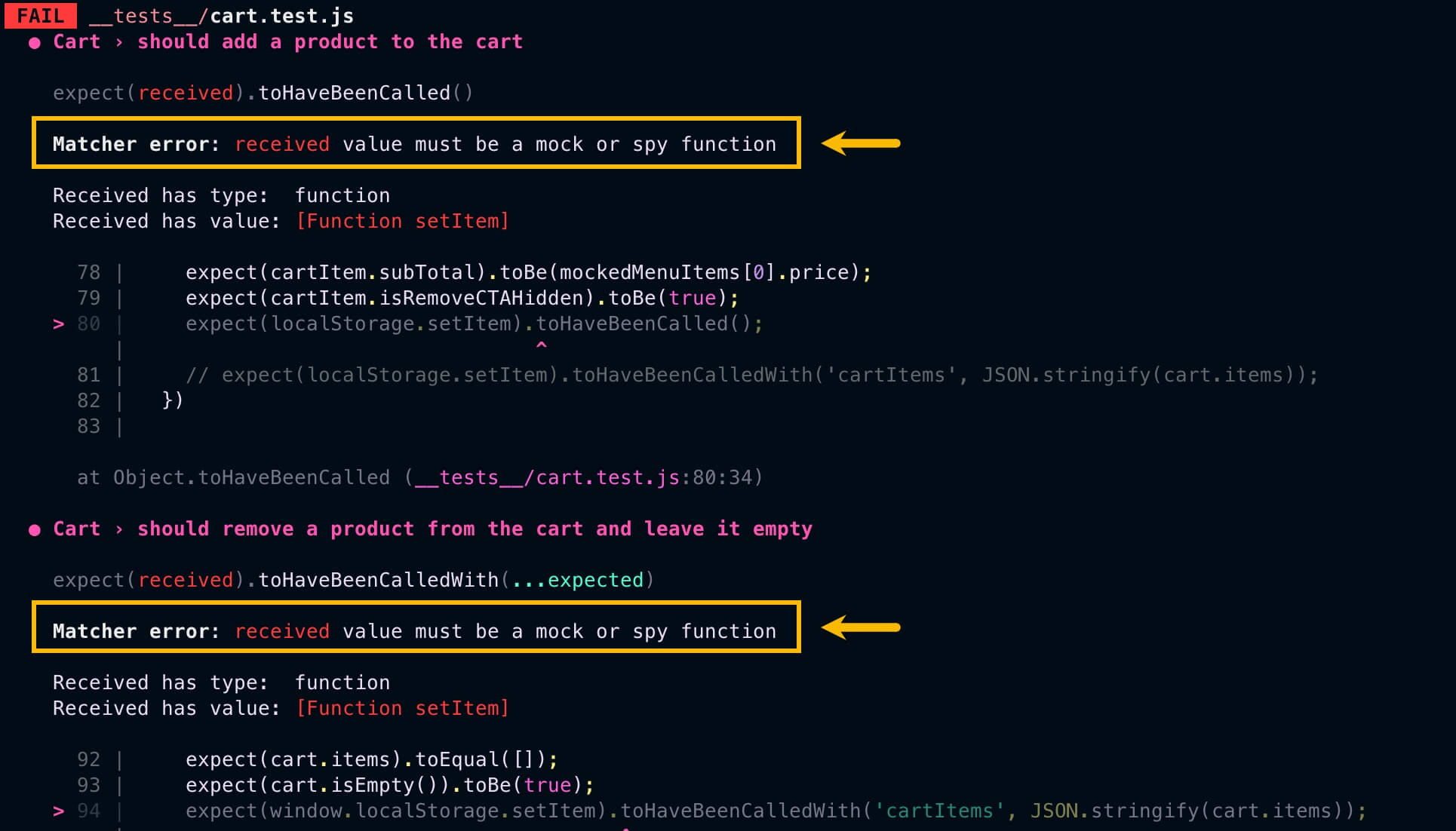How to test localStorage with Jest

Introduction
When testing features that interact with localStorage, you need to mock or spy on the behavior to isolate it. It’s common practice to isolate Web APIs or third-party packages that don’t need to be tested in a particular test suite.
The challenge with localStorage is that it can’t be mocked or spied on as usual due to a recent change in the jsdom library.
Implementation details
Consider the following Cart class that allows users to add products to the cart:
export class Cart {
// Constructor initializes properties for items, subTotal, tax, total, and totalElement
constructor() {
this.subTotal = 0;
this.tax = 0;
this.total = 0;
this.items = this.setProducts(getItemFromLocalStorage('cartItems'));
// Create an instance of CartTotals with initial values and assign it to totalElement
this.totalElement = new CartTotals(this.subTotal, this.tax, this.total);
}
// Method to set the products in the cart
setProducts(products) {
// Check if products are not empty
if (!products || products.length === 0) {
return [];
}
return products.map(product => new CartItem({ ...product }));
}
// Method to add a product to the cart
addProduct(productDetails) {
// Create a new CartItem instance with the provided product details
const cartItem = new CartItem(productDetails);
// Add the new cart item to the items array
this.items.push(cartItem);
// Render the updated cart
this.render();
// Save updated items array to localStorage
setItemToLocalStorage('cartItems', this.items);
}
// Method to remove a product from the cart
removeProduct(productDetails) {
// Filter out the item with the specified name from the items array
const newItems = this.items.filter(item => item.name != productDetails.name);
this.items = newItems;
// Render the updated cart
this.render();
// Update items array in localStorage after removing item
setItemToLocalStorage('cartItems', this.items);
}
}The test cases for asserting the correct behavior when adding or removing a product to the cart should be as follows:
test('should add a product to the cart', () => {
// Arrange & Act
cart.addProduct(mockedMenuItems[0]);
// Assert
const cartItem = cart.items[0];
expect(cartItem.name).toBe(mockedMenuItems[0].name);
expect(cartItem.price).toBe(mockedMenuItems[0].price);
expect(cartItem.quantity).toBe(mockedMenuItems[0].quantity);
expect(cartItem.image).toBe(mockedMenuItems[0].image);
expect(cartItem.alt).toBe(mockedMenuItems[0].alt);
expect(cartItem.subTotal).toBe(mockedMenuItems[0].price);
expect(cartItem.isRemoveCTAHidden).toBe(true);
// Assert 'localStorage' 'setItem' call with args
expect(localStorage.setItem).toHaveBeenCalledWith('cartItems', JSON.stringify(cart.items));
})
test('should remove a product from the cart and leave it empty', () => {
// Arrange & Act
cart.addProduct(mockedMenuItems[0]);
cart.removeProduct(mockedMenuItems[0]);
// Assert
expect(cart.items).toEqual([]);
expect(cart.isEmpty()).toBe(true);
// Assert 'localStorage' 'setItem' call with args
expect(localStorage.setItem).toHaveBeenCalledWith('cartItems', JSON.stringify(cart.items));
})In the last line of each test, we are asserting the setItem localStorage correct call with the cart.items as argument. If we run the test, we should expect it to pass given that Jest mocks the localStorage behavior automatically. However, we get the following errors:

The issue is that currently localStorage cannot be mocked or spied on by Jest as usual due to changes in the jsdom library, which runs underneath Jest to simulate the DOM browser behavior. We need to find a way to mock it effectively.
Testing localStorage feature with Jest
Let’s examine the following two workarounds to manage this problem when performing unit testing with Jest and analyze their drawbacks.
First approach - spy on the prototype
At first glance, this seems like the way to go for mocking the localStorage property. Inside our test suite, we can add the following lines of code:
// Spy on the 'localStorage' prototype
jest.spyOn(Object.getPrototypeOf(window.localStorage), 'setItem')
// Mock the 'setItem' method of the 'localStorage' property
Object.setPrototypeOf(window.localStorage.setItem, jest.fn())Here we are spying on the prototype of the Storage interface belonging to the Web Storage API. This approach has a drawback as the spy can now observe and manipulate every instance of the class all at once. This means that we won’t be able to differentiate between localStorage and sessionStorageas both are instances of Storage and inherit from the Storage prototype.
This leads us to think about a more convenient way to mock the localStorage specifically.
Second approach - mock the window localStorage property
In this approach, we are mocking the localStorage property of the window global object using the following helper function:
/**
* Function that mocks a property on the 'window' object with a specified value.
* Sets up the mock before each test suite and restores
* the original property after each test suite.
* @example
* mockWindowProperty('innerWidth', 500);
* @param {string} property The name of the property to mock on 'window' object.
* @param {*} value The value to set on mocked property.
*/
export const mockWindowProperty = (property, value) => {
const originalProperty = window[property];
delete window[property];
beforeAll(() => {
if (originalProperty !== undefined) {
Object.defineProperty(window, property, {
configurable: true,
writable: true,
value,
});
} else {
window[property] = value;
}
});
afterAll(() => {
if (originalProperty !== undefined) {
window[property] = originalProperty;
} else {
delete window[property];
}
});
};We can then import the helper function in our testing file and pass the localStorage property into it:
import { mockWindowProperty } from "../__mocks__/mockWindowProperty";describe('Cart', () => {
mockWindowProperty('localStorage', {
setItem: jest.fn(),
getItem: jest.fn(),
removeItem: jest.fn()
});
})Here we are assigning each localStorage method to a mock Jest function to have control over the Web Storage API in our testing environment.
If we now run the test suite again , we can confirm that all tests are passing:

You can click on the collapsible section to see the detail of the final test suite for our Cart component:
cart.test.js
import { Cart } from "../js/components/cart";
import { CartItem } from "../js/components/cartItem";
import { mockedMenuItems } from "../__mocks__/menuData";
import { CartTotals } from "../js/components/cartTotals";
import { mockWindowProperty } from "../__mocks__/mockWindowProperty";
describe('Cart', () => {
let cart, cartContainer, totalsContainer, emptyMessage;
mockWindowProperty('localStorage', {
setItem: jest.fn(),
getItem: jest.fn(),
removeItem: jest.fn()
});
beforeEach(() => {
cart = new Cart();
cartContainer = document.createElement('ul');
totalsContainer = document.createElement('div');
emptyMessage = document.createElement('p');
cartContainer.classList.add('cart-summary');
totalsContainer.classList.add('totals');
emptyMessage.classList.add('empty');
jest.spyOn(document, 'querySelector').mockImplementation((selector) => {
if (selector === '.cart-summary') {
return cartContainer;
}
if (selector === '.totals') {
return totalsContainer;
}
if (selector === '.empty') {
return emptyMessage;
}
});
})
afterEach(() => {
jest.restoreAllMocks();
});
test('should create a Cart instance with correct initial values', () => {
// Assert
expect(cart.items).toEqual([]);
expect(cart.subTotal).toBe(0);
expect(cart.tax).toBe(0);
expect(cart.total).toBe(0);
expect(cart.totalElement.subTotal).toBe(0);
expect(cart.totalElement.tax).toBe(0);
expect(cart.totalElement.total).toBe(0);
})
test('should render the entire cart, including items and totals', () => {
// Arrange
const cartItem = new CartItem(mockedMenuItems[0]);
cart.items.push(cartItem);
// Act
cart.render();
// Assert
const cartItems = cartContainer.querySelectorAll('cart-item');
const cartTotal = totalsContainer.querySelector('cart-totals');
expect(cartItems.length).toBe(1);
expect(cartTotal).not.toBeNull();
})
test('should add a product to the cart', () => {
// Arrange & Act
cart.addProduct(mockedMenuItems[0]);
// Assert
const cartItem = cart.items[0];
expect(cartItem.name).toBe(mockedMenuItems[0].name);
expect(cartItem.price).toBe(mockedMenuItems[0].price);
expect(cartItem.quantity).toBe(mockedMenuItems[0].quantity);
expect(cartItem.image).toBe(mockedMenuItems[0].image);
expect(cartItem.alt).toBe(mockedMenuItems[0].alt);
expect(cartItem.subTotal).toBe(mockedMenuItems[0].price);
expect(cartItem.isRemoveCTAHidden).toBe(true);
expect(localStorage.setItem).toHaveBeenCalledWith('cartItems', JSON.stringify(cart.items));
})
test('should remove a product from the cart and leave it empty', () => {
// Arrange & Act
cart.addProduct(mockedMenuItems[0]);
cart.removeProduct(mockedMenuItems[0]);
// Assert
expect(cart.items).toEqual([]);
expect(cart.isEmpty()).toBe(true);
expect(localStorage.setItem).toHaveBeenCalledWith('cartItems', JSON.stringify(cart.items));
})
test('should update the totals section with correct values', () => {
// Arrange
const subTotal = 10;
const tax = 1;
const total = 11;
const subTotalContainer = document.createElement('div');
const taxContainer = document.createElement('div');
const totalContainer = document.createElement('div');
subTotalContainer.classList.add('subtotal');
taxContainer.classList.add('tax');
totalContainer.classList.add('total');
jest.spyOn(CartTotals.prototype, 'querySelector').mockImplementation((selector) => {
if (selector === '.subtotal') {
return subTotalContainer;
}
if (selector === '.tax') {
return taxContainer;
}
if (selector === '.total .price') {
return totalContainer;
}
});
// Act
cart.updateTotals(subTotal, tax, total);
// Assert
expect(cart.totalElement.subTotal).toBe(subTotal);
expect(cart.totalElement.tax).toBe(tax);
expect(cart.totalElement.total).toBe(total);
})
})Conclusion
In this article, we learned how to effectively test built-in browser features like localStorage using Jest. By mocking the localStorage property of the window object, we were able to isolate the localStorage behavior and ensure our tests pass. This technique can be applied to other Web APIs that may cause issues during unit testing.